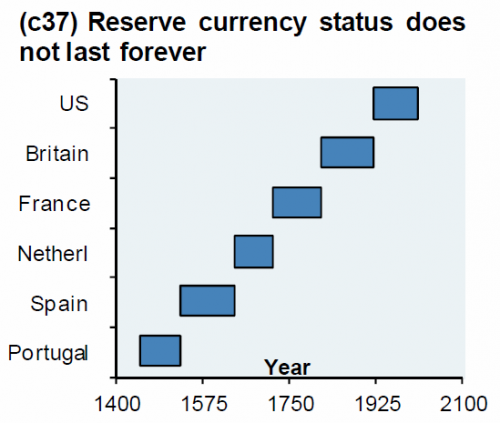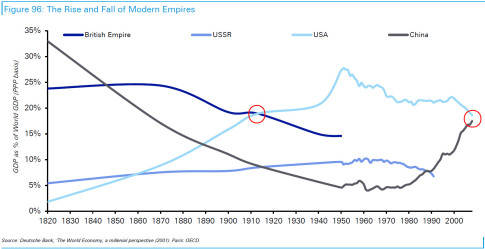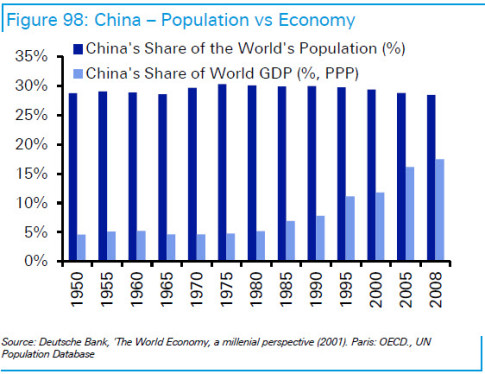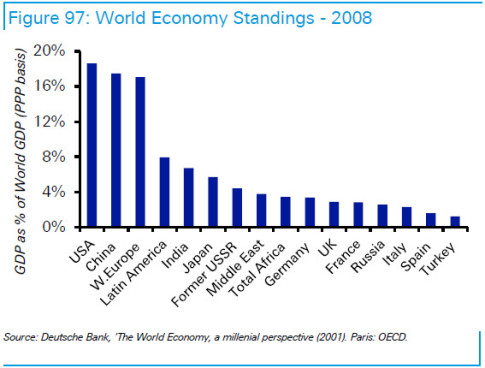Related info:
– Russia And Iran Sign Defense Deal, … ‘May Resolve’ S-300 Missile Delivery Issue (RT, Jan 20, 2015)
– De-Dollarization Complete: Iran Abandons US Dollar In Foreign Trade (ZeroHedge, Jan 24, 2015):
Since last May (and likely long before) when the topic of “de-dollarization” was first uttered in official circles (and not just tin-foil-hat-wearing blogs), the rest of the world (un-isolated as they are) has been warming to the idea that perhaps – just perhaps – it is time to de-dollarize (more or less depending on the despotic region in question). From currency swap agreements to bi-lateral trade agreements to selling US Treasuries and greatly rotating USD reserves into gold, the world’s nations (small and large) appear less and less comfortable holdings dollars in this tempestuous world. Among the supporters of that first “de-dollarization” meeting were China and Iran and while the former continues to work down its exposure, the latter – Iran, according to Tasnim news agency, has almost entirely eliminated USDollars from its reserves and is no longer using dollars in foreign trade.
Nothing lasts forever…
As Bloomberg reports,Iran is no longer using US Dollars in foreign trade
“In trade exchanges with foreign countries, Iran uses other currencies including Chinese yuan, euro, Turkish lira, Russian ruble and South Korean Won,” Gholamali Kamyab, deputy head of the Central Bank of Iran, tells Tasnim news agency.
Iran to “soon” sign bilateral currency swap agreements with some countries, Kamyab says, without naming countries
As a reminder, The Central Bank of Iran said back in June 2014 it had “almost rid” U.S. dollar from forex reserves, replacing it with U.A.E. dirham… it appears to have completed that transition.
* * *
De-dollarization complete… and all this as the US tries to broker anti-nuclear accords and delays sanctions…
* * *
As we detailed previously, this move should not be a great surprise to any foreign nation.
America’s global economic dominance has been declining since 1998, well before the Global Financial Crisis. A large part of this decline has actually had little to do with the actions of the US but rather with the unraveling of a century’s long economic anomaly. China has begun to return to the position in the global economy it occupied for millenia before the industrial revolution. Just as the dollar emerged to global reserve currency status as its economic might grew, so the chart below suggests the increasing push for de-dollarization across the ‘rest of the isolated world’ may be a smart bet…
As Deutsche Bank’s Jim Reid explains,
In 1950 China’s share of the world’s population was 29%, its share of world economic output (on a PPP basis) was about 5% (Figure 98). By contrast the US was almost the reverse, with 8% of the world’s population the US commanded 28% of its economic output.
By 2008, China’s huge, centuries-long economic underperformance was well down the path of being overcome (Figure 97).
Based on current trends China’s economy will overtake America’s in purchasing power terms within the next few years. The US is now no longer the world’s sole economic superpower and indeed its share of world output (on a PPP basis) has slipped below the 20% level which we have seen was a useful sign historically of a single dominant economic superpower. In economic terms we already live in a bipolar world. Between them the US and China today control over a third of world output (on a PPP basis).
However as we have already highlighted, the relative size of a nation’s economy is not the only determinant of superpower status. There is a “geopolitical” multiplier that must be accounted for which can allow nations to outperform or underperform their economic power on the global geopolitical stage. We have discussed already how first the unwillingness of the US to engage with the rest of the world before WWII meant that on the world stage the US was not a superpower inspite of its huge economic advantage, and second how the ability and willingness of the USSR to sacrifice other goals in an effort to secure its superpower status allowed it to compete with the US for geopolitical power despite its much smaller economy. Looking at the world today it could be argued that the US continues to enjoy an outsized influence compared to the relative size of its economy, whilst geopolitically China underperforms its economy. To use the term we have developed through this piece, the US has a geopolitical multiplier greater then 1, whilst China’s is less than 1. Why?
On the US side, almost a century of economic dominance and half a century of superpower status has left its impression on the world. Power leaves a legacy. First the USA’s “soft power” remains largely unrivalled – US culture is ubiquitous (think McDonald’s, Hollywood and Ivy League universities), the biggest US businesses are global giants and America’s list of allies is unparalleled. Second the US President continues to carry the title of “leader of the free world” and America has remained committed to defending this world. Although more recently questions have begun to be asked (more later), the US has remained the only nation willing to lead intervention in an effort to support this “free world” order and its levels of military spending continues to dwarf that of the rest of the world. US military spending accounts for over 35% of the world total and her Allies make up another 25%.
In terms of Chinese geopolitical underperformance there are a number of plausible reasons why China continues to underperform its economy on the global stage. First and foremost is its list of priorities. China remains committed to domestic growth above all other concerns as, despite its recent progress, millions of China’s citizens continue to live in poverty. Thus so far it has been unwilling to sacrifice economic growth on the altar of global power. This is probably best reflected in the relative size of its military budget which in dollar terms is less than a third the size of Americas. Second China has not got the same level of soft power that the US wields. Chinese-style communism has not had the seductive draw that Soviet communism had and to date the rise of China has generally scared its neighbors rather then made allies of them. These factors probably help explain why in a geopolitical sense the US has by and large appeared to remain the world’s sole superpower and so, using the model of superpower dominance we have discussed, helps explain why global geopolitical tensions had remained relatively low, at least before the global financial crisis.
However there is a case to be made that this situation has changed in the past five or so years. Not only has China’s economy continued to grow far faster than America’s, perhaps more importantly it can be argued that the USA’s geopolitical multiplier has begun to fall, reducing the dominance of the US on the world stage and moving the world towards the type of balanced division of geopolitical power it has not seen since the end of the Cold War. If this is the case then it could be that the world is in the midst of a structural, not temporary, increase in geopolitical tensions.
Why do we suggest that the USA’s geopolitical multiplier, its ability to turn relative economic strength into geopolitical power, might be falling? Whilst there are many reasons why this might be the case, three stand out. First, since the GFC the US (and the West in general) has lost confidence. The apparent failure of laissez faire economics that the GFC represented combined with the USA’s weak economic recovery has left America less sure then it has been in at least a generation of its free market, democratic national model. As this uncertainty has grown, so America’s willingness to argue that the rest of the world should follow America’s model has waned. Second the Afghanistan and in particular the Iraq War have left the US far less willing to intervene across the world. One of the major lessons that the US seems to have taken away from the Iraq war is that it cannot solve all of the world’s problems and in fact will often make them worse. Third, the rise of intractable partisan politics in the US has left the American people with ever less faith in their government.
The net result of these changes in sentiment of the US people and its government has been the diminishment of its global geopolitical dominance. The events of the past 5+ years have underlined this. Looking at the four major geopolitical issues of this period we raised earlier – the outcome of the Arab Spring (most notably in Syria), the rise of the Islamic State, Russia’s actions in Ukraine and China’s regional maritime muscle flexing – the US has to a large extent been shown to be ineffective. President Obama walked away from his “red line” over the Syrian government’s use of chemical weapons. The US has ruled out significant intervention in Northern Iraq against the Islamic State.
America has been unable to restrain Pro-Russian action in Ukraine and took a long time (and the impetus of a tragic civilian airplane disaster) to persuade her allies to bring in what would generally be considered a “first response” to such a situation – economic sanctions. And so far the US has had no strategic response to China’s actions in the East and South China seas. Importantly these policy choices don’t necessarily just reflect the choice of the current Administration but rather they reflect the mood of the US people. In Pew’s 2013 poll on America’s Place in the World, a majority (52%) agreed that “the US should mind its own business internationally and let other countries get along the best they can on their own”. This percentage compares to a read of 20% in 1964, 41% in 1995 and 30% in 2002.
The geopolitical consequences of the diminishment of US global dominance
Each of these events has shown America’s unwillingness to take strong foreign policy action and certainly underlined its unwillingness to use force. America’s allies and enemies have looked on and taken note. America’s geopolitical multiplier has declined even as its relative economic strength has waned and the US has slipped backwards towards the rest of the pack of major world powers in terms of relative geopolitical power.
Throughout this piece we have looked to see what we can learn from history in trying to understand changes in the level of structural geopolitical tension in the world. We have in general argued that the broad sweep of world history suggests that the major driver of significant structural change in global levels of geopolitical tension has been the relative rise and fall of the world’s leading power. We have also suggested a number of important caveats to this view – chiefly that a dominant superpower only provides for structurally lower geopolitical tensions when it is itself internally stable. We have also sought to distinguish between a nation being an “economic” superpower (which we can broadly measure directly) and being a genuine “geopolitical” superpower (which we can’t). On this subject we have hypothesised that the level of a nations geopolitical power can roughly be estimated multiplying its relative economic power by a “geopolitical multiplier” which reflects that nations ability to amass and project force, its willingness to intervene in the affairs of the world and the extent of its “soft power”.
Given this analysis it strikes us that today we are in the midst of an extremely rare historical event – the relative decline of a world superpower. US global geopolitical dominance is on the wane – driven on the one hand by the historic rise of China from its disproportionate lows and on the other to a host of internal US issues, from a crisis of American confidence in the core of the US economic model to general war weariness. This is not to say that America’s position in the global system is on the brink of collapse. Far from it. The US will remain the greater of just two great powers for the foreseeable future as its “geopolitical multiplier”, boosted by its deeply embedded soft power and continuing commitment to the “free world” order, allows it to outperform its relative economic power. As America’s current Defence Secretary, Chuck Hagel, said earlier this year, “We (the USA) do not engage in the world because we are a great nation. Rather, we are a great nation because we engage in the world.” Nevertheless the US is losing its place as the sole dominant geopolitical superpower and history suggests that during such shifts geopolitical tensions structurally increase. If this analysis is correct then the rise in the past five years, and most notably in the past year, of global geopolitical tensions may well prove not temporary but structural to the current world system and the world may continue to experience more frequent, longer lasting and more far reaching geopolitical stresses than it has in at least two decades. If this is indeed the case then markets might have to price in a higher degree of geopolitical risk in the years ahead.




Iran has not used the dollar in years since Carter closed the borders to them in 1980…….The idea Iran, who has been using and accepting all currencies for years would now stop using the dollar is absurd. They have nothing to do with it…….were the first to join BRICS……